If you’ve been following this column at all, you know that I enjoy teaching folks about the history of the real Middle Ages by pointing out the real issues with the reel Middle Ages.
This often leads to the misconceptions that I don’t “get” that many movies are meant to be “just fantasy” or that I hate most medieval movies. To such keen criticisms, I would reply that I totally get that fantasies aren’t meant to be historically accurate (though they clearly utilize that history and, fantasy or not, “teach” audiences about it), and oh my god I totally enjoy most medieval movies.
No. Scratch that. I adore most medieval movies — even the ones that cause me to roll my eyes at their historical inaccuracies.
When I’m asked what my favorite medieval movie is, though, my answer is always the same: A Knight’s Tale (dir. Brian Helgeland, 2001). Largely — and I’m gonna try to make this make sense, I swear — my undying love for this film is because of its perfect historical inaccuracies.
I first saw A Knight’s Tale in theaters. I was just finishing up my first Masters degree (in Medieval Studies, natch), and I went with a good medievalist friend of mine (Hi, Keith!) to check the movie out for, um, research purposes. It took us about five minutes for us to fall in love with it.
All these years later, I still love it.
Honestly, those first five minutes of the film exemplify almost everything that’s great about the movie. After a standard title-card historical synopsis that explains how jousting was a sport of the noble class in the Middle Ages, we meet three young men: William Thatcher (played by the late Heath Ledger), Roland (Mark Addy), and Wat Valhurst (Alan Tudyk). I love them all.
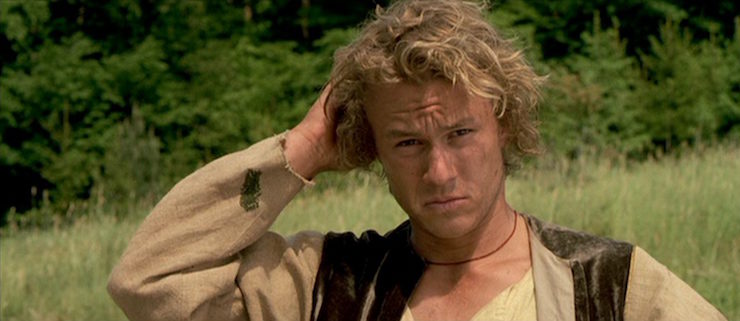
The three young fellows are squires to Sir Ector, and they’re in a bind. Sir Ector has been competing in a minor jousting tournament, and he’s been doing quite well: he only needs to ride once more through the jousting lane without being unhorsed, and he’ll be victorious. He’ll get winnings, and his squires — who haven’t eaten in three days — will get a square meal. The only problem, as the young lads have just discovered, is that Sir Ector Has ceased to be, shuffled off this mortal coil, and gone to meet his maker. He is an ex-knight.
Wat: What do you mean, dead?
Roland: The spark of his life is smothered in shite. His spirit is gone but his stench remains. Does that answer your question?
Within these few minutes, we see the personalities of all three of these squires, and they’re fantastic. Roland is the oldest, most experienced, and most sensible. When he sees that Ector is dead, his immediate response is to think about fetching a priest. Wat isn’t of the same mind. His reaction is to “rouse” the dead knight by kicking and beating him, taking out his frustrations in the most physical manner possible. And then there’s William, who is a deft middle ground of passions and practicality. Heath Ledger gives him a perfect balance of personality: he’s hungry, he’s angry, but he’s also resourceful and pragmatically idealistic. If he puts on Sir Ector’s armor, he muses, no one will know he’s not a noble. They can get the money, they can eat, and they can deal with the dead man later. It’s not like Ector is going anywhere, after all.
William: I’ve waited my whole life for this moment.
Wat: “You’ve waited your whole life for Sir Ector to shite himself to death?”
The scene now shifts to opening credits that unfold over scenes of the tournament and its crowd … all set to the tune of Queen’s “We Will Rock You.”
A lot of critics were thrown at this point: they complained that using a soundtrack of classic rock for a movie that is set in the 1370s is tremendously anachronistic.
They’re quite right. The music of Queen is about six centuries off the mark for the movie’s setting. At the same time, as the director himself rightly pointed out, a traditional symphonic score would also be pretty damn anachronistic, even if we don’t think of it that way. There were no symphonies in the fourteenth century, after all.
The anachronism is just getting started, though, and how it happens shows that there’s something important at work here: before we know what’s happening, Queen isn’t just the background soundtrack for the audience: it’s what the tournament crowd itself is singing. And they’re singing it while doing the wave, eating turkey legs, and waving banners in support of one knight or another. Not one bit of it is accurate to history, yet it’s oh so perfectly historical.
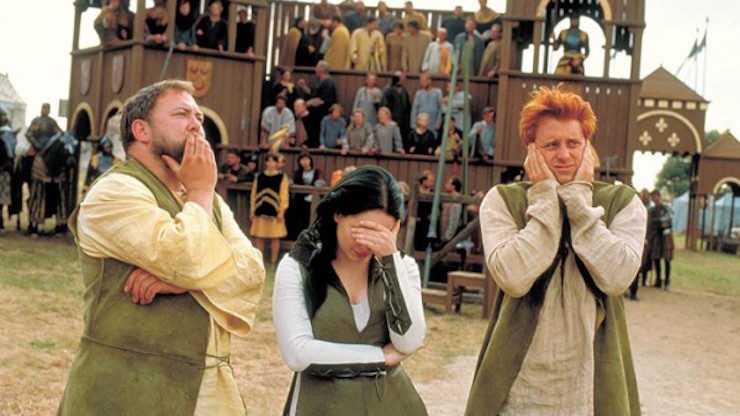
This is a complex idea, and it’ll take some unpacking. My medievalist friend with whom I watched the movie in the theater would go on to write a wonderful and oft-cited essay about the unfair standards against which academics judge medieval films. It’s a rebuke, in many ways, of the kind of naysaying that I sometimes do in this column. Along the way, Dr Kelly (Hi, Keith!) utilizes A Knight’s Tale to make his point (I told you we both loved this film):
From a post-modern perspective, this film challenges the ideas of a medieval past as being so very different from the present. Spectators singing a rock and roll song by Queen at a medieval joust certainly raise the eyebrow of many, but the song certainly strikes a more familiar chord with a modern audience than the strumming of a lute. Does the modern song convey the enthusiasm and pageantry of such events to a modern audience more successfully than an authentic tune would have done? A Geoffrey Chaucer — thin, energetic and young — who cavorts before the nobles and composes caustic and humorous rhyme, while not the Geoffrey found in the Ellesmere manuscript, certainly conveys the poet’s style (or at least a particular view of that style) in a modern sense.
In other words, there is a truth of historical reality, and then there is a truth of historical relationship — a difference between knowing the actual physical feel of the past and the relative emotional feel of it. This is not to say that anything goes and facts are no longer facts. As I’ve noted before, that’s pretty much my idea of Hell. Rather, facts have contexts, and that context drives our emotional responses to the facts.
Because we don’t live in the fourteenth century, we don’t have the same context for a historically accurate jousting as a person would have had back then. A tournament back in the day was like the Super Bowl, but a wholly accurate representation of the event would not give us that same sense. Rather than pulling us into the moment, the full truth would push us out of it: rather than fostering the connection between the present and the past, it would have emphasized the separation. So Helgeland split the difference: he included tons of historical accuracies with non-historical familiarities.
It’s brilliant and delightful fun.
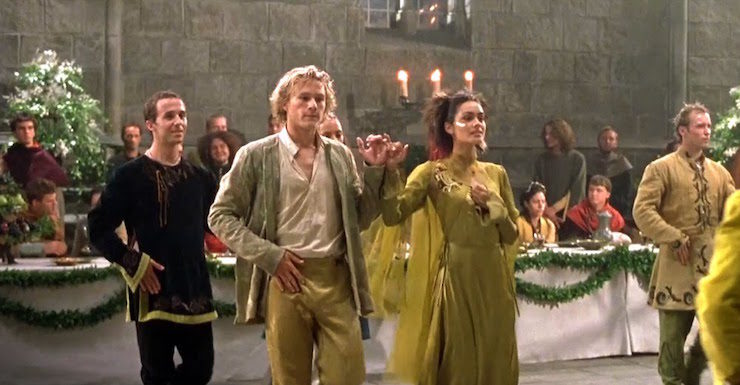
As good a job as that opening scene does in establishing this framework, though, my favorite example of how A Knight’s Tale uses these twin presentations of truth is later in the film, when William — now jousting in disguise as Sir Ulrich von Liechtenstein — goes to a dance. The dance begins by being truthful to historical reality: medieval instruments making simple sounds as the dancers go through formalized movements. It all seems quite stilted and unexciting to us now, but such a dance would have been quite the party in the fourteenth century.
So how does the film convey this? By having the musicians seamlessly slip their lute-strumming into a familiar tune that evolves into David Bowie’s “Golden Years” … at the very same time that the dancers devolve their formalized organization into the unbridled joy and chaos of a modern dance floor.
Oh hell yeah.
(If you’re interested, composer Carter Burwell has written about the difficulties of getting the music to work through this sequence.)
The filmmakers even took this same balance into their costuming and design. The hairstyles and garb of love-interest Jocelyn (Shannyn Sossamon) and her lady-in-waiting, Christiana (Berenice Bejo), are particularly fascinating in this regard.
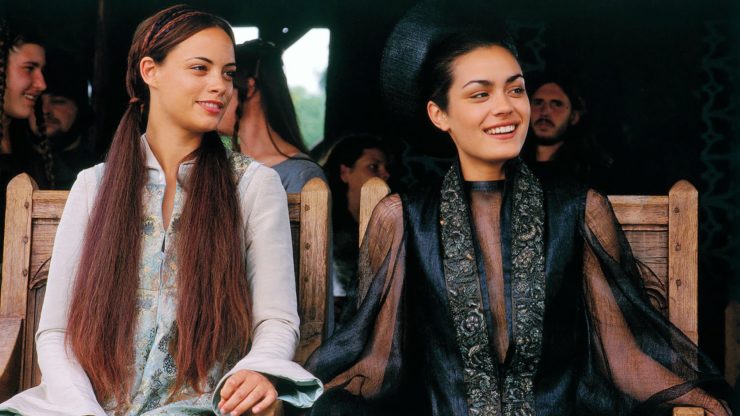
Still, I don’t want to give you the impression that Helgeland just tossed real historical truth out the window. There’s a lot of medieval truth in this film. Roland’s concern about the implications of the number 13, for instance, or the fascination with the symbology of the phoenix. Or having patents of nobility with wax seals attached to them.
Ulrich von Lichtenstein was a real knight (though dead for about 100 years by the time of the movie’s action, and he’s most well-known for writing about what it means to be a knight. The film splices the inspiration of this idea with Geoffrey Chaucer’s Canterbury Tales (thus Simon the Summoner and Peter the Pardoner) and legends of the life of William Marshall with a subplot involving the Free Companies via Adhemar, count of Anjou (Rufus Sewell) and his squire Germaine (Scott Handy).
And oh yes, Chaucer is literally a character in this film. Played by Paul Bettany, he steals scenes left and right. Hell, his first appearance in the film is his naked ass striding across the frame and on down the road, interrupting our lads in their journey:
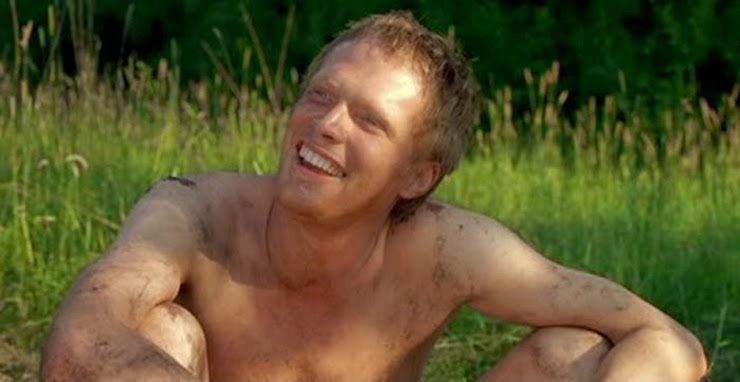
William: Oi sir, what are you doing?
Chaucer: Uh… trudging. [pause] You know, trudging? To trudge: the slow, weary, depressing yet determined walk of a man who has nothing left in life except the impulse to simply soldier on.
William: Uhhh… were you robbed?
Chaucer: [laughs] Interesting question, actually. Yes, but at the same time a huge resounding no. It’s more sort of an… involuntary vow of poverty… really.
But you know on the brighter side trudging does represent pride. Pride, resolve, and faith in the good lord almighty … please, Christ, rescue me from my current tribula —
[Steps on a thorn and uses his teeth to bite it out of his foot]
— tions.
Roland: Who are you?
Chaucer: The lilium inter spinus, the lily among thorns. Geoffrey Chaucer’s the name, writing’s the game.
[Turns away, turns back]
Chaucer: Chaucer? Geoffrey Chaucer, the writer?
Wat: A what?
Chaucer: A wha- a what? A writer. You know, I write, with ink and parchment. For a penny, I’ll scribble you anything you want. From summons, decrees, edicts, warrants, patents of nobility. I’ve even been know to jot down a poem or two, if the muse descends. You’ve probably read my book? The Book of the Duchess?
[They look at each other, shake their heads]
Chaucer: Fine. Well, it was allegorical.
Roland: Well, we won’t hold that against you, that’s for every man to decide for himself.
I’m a Chaucer fanboy, obviously, but damnit that’s funny.
Look, I don’t want to give too much away, because if you haven’t seen this film you NEED TO DO SO RIGHT NOW OH MY GOD WHY ARE YOU STILL READING THIS AND NOT WATCHING IT … but I will say this:
This movie has the best push into a flashback that I’ve ever seen. It features a medieval training montage to the tune of “Low Rider.” The acting is consistently fantastic, even from relatively “minor” characters like Kate the badass blacksmith (Laura Fraser) and Sir Thomas Colville (James Purefoy). And so many lines are so very quotable.
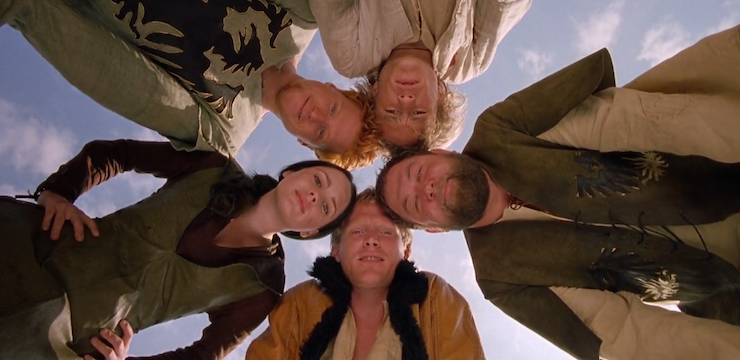
Plus, you know, slow-motion jousting with exploding lances is awesome.
Mike’s Medieval Ratings
Authenticity: 6 out of 10 Jocelyn sunbonnets
Just Plain Fun: 20 out of 10 gardens of his turbulence
Seriously, follow your feet and go check this one out. Change your stars.
Originally published in December 2017.
 Michael Livingston is a Professor of Medieval Culture at The Citadel who has written extensively both on medieval history and on modern medievalism. His historical fantasy trilogy set in Ancient Rome, The Shards of Heaven, The Gates of Hell, and The Realms of God, is available from Tor Books.
Michael Livingston is a Professor of Medieval Culture at The Citadel who has written extensively both on medieval history and on modern medievalism. His historical fantasy trilogy set in Ancient Rome, The Shards of Heaven, The Gates of Hell, and The Realms of God, is available from Tor Books.










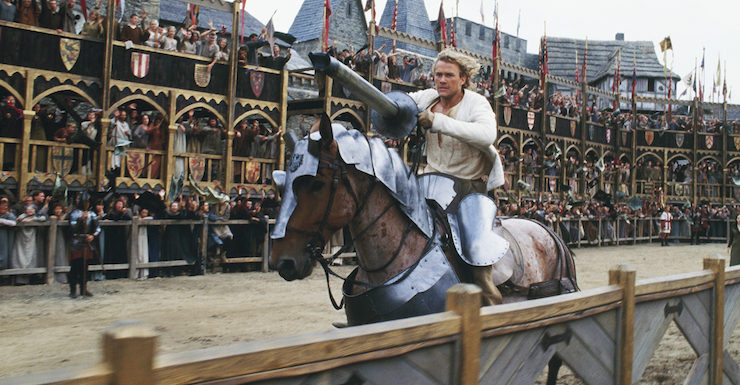
This is my absolute favorite movie of all time!!!
I have to admit, I have a very fond place in my heart for this film, for many of the same reasons you noted. The first time I watched it, the anachronisms threw me off, but over time it’s become one of those movies I can watch whenever I see that it’s on. And those are perfect ways to address them. Sure, the music is wrong for the period… but so is ANY musical score we might choose, because those instruments – let alone a symphony – didn’t exist. And looking at the dance as a spliced moment of “this is how it probably looked” merging into “this is what we do today” is a great way of thinking about those connections. Plus Bowie and Queen… and jousting!
Hey, but I do hope you get to see Outlaw King on Netflix and do a review of it. Definitely right up your alley (and I thought it was pretty damned good).
No joke, this movie is being presented at a local museum while it’s hosting an exhibit on Medieval Armor. When i saw that, I, out loud IN THE MUSEUM, LOUDLY, said “F*CK YES THAT’S PERFECT.” :D
Great article, thank you! It’s one of my favorite movies as well.
I read this when it was first published and watched the movie as a result. I loved it!
Thank you for this bit of writing.
So I’ve never had someone put into words why this is one of my favorite movies. Thank you very much for that
I liked this movie a lot. Its absurdities add to its whole and makes it a lot of fun.
The one thing I didn’t get was the lusting after Jocelyn. I just didn’t buy her.
“NO! I WILL NOT RUN! I’m a knight.”
*chills*
First, understand that I saw this movie on a home VCR at a time when I couldn’t have been more against rock music in general principle, plus I just never liked it (*quickly ducks*).
I had a passing acquaintance with medieval armor, costuming, and dance after a degree in theater and having researched it all afresh for my work on a community play. At the same time, I also was quite conservative in my approach to visual arts, and would have refused to watch the movie had I been told that Bettany would make his first appearance naked. All that is to say, I was predisposed to being absolutely outraged by this movie.
When they first started up Queen, and showed the wave, I *was* outraged…but suddenly, it all fell into place. This movie was trying to show the “truth in historical relationship”—and it succeeded! It absolutely broke down my literalist thinking, and in spite of my being the very last person I could have expected to appreciate this movie, I not only appreciated it, I enjoyed it (and still do)!
@6. ragnarredbeard: “The one thing I didn’t get was the lusting after Jocelyn. I just didn’t buy her.”
She was not to be bought, sir! She was to be won! No, wait, that’s not right. She was to be won over… with bad and fumbling poetry. And pain! Lots of pain!
Personally I would’ve gone for her handmaid, but Jocelyn is plenty sexy.
I love this movie, but for my money, I always thought the handmaiden was prettier than the love interest.
The charm of A Knight’s Tale is undeniable. It’s fun, funny and, in the end, somehow surprisingly moving, especially for such a silly movie with such a (let’s be honest) predictable denouement. It derives an extra layer of poignancy by being one of the few films that the talented Heath Ledger ever got to make before his tragic early death. And Paul Bettany is just wonderful as Geoffrey Chaucer.
I think I’m overdue to revisit A Knight’s Tale.
I think I posted this the last time this article went by: Watch it as a double header with Ladyhawke, which also has ahistorical music and costuming and also borrows so heavily from actual medieval literature that even though the script was written for the movie you’d swear it was ripped from the parchment.
If you’re planning a movie marathon, add The Princess Bride.
Shannyn Sossaman is very lovely but her style of beauty would so not be appreciated in the real 14th c. Her dark coloring, square jaw and wide mouth were exactly opposite of the baby faced blond who was the medieval ideal. She might well have her admirers but she wouldn’t be a recognized beauty as she is depicted. And those costumes are just crazy. I love them but they are nuts.
Jocelyn and her handmaiden are lovely but personally I think Kate the blacksmith outshines them both. But of course as a straight woman my main attention is on the man-candy. There isn’t a bad looking male on the screen.
The “Golden Years” group dance is among my favorite dance scenes in movies, but I also love how they… amped up the frenetic energy of the jousting scenes by filing the hollow lances with dry pasta that flies every where when they break on the shields of their opponents!
Great points. The movie makes the point that these events were the NASCAR or Super Bowl of their day, massive public entertainment events without parallel, with people travelling hundreds of miles to take part. The most successful knights were like rock stars or sports stars, and were appropriately rich (and sometimes didn’t know when to quit with age and fell into penury).
I feel most historical fiction and most fantasy – apart from George R.R. Martin (whose The Hedge Knight predated the movie by three years and feels like a somewhat more tragic counterpart) – doesn’t really get this part of the appeal.
@13. princess; ” There isn’t a bad looking male on the screen.”
Say Wat? Even He Who Wants to Fong People?
Including Wat, he’s not drop dead gorgeous like Rufus Sewell or James Purfoy but he’s adorable in his gangly redheaded way.
@13 “but personally I think Kate the blacksmith outshines them both” Amen. Far more interesting character as well. She’d be a tad bit more muscular in real life though ;)
I’ll have to give it a try. I was too cynical to see it when it came out.
I’d you are having a marathon, include Monty Python and the Holy Grail for fun, and Flesh & Blood for near authenticity.
This movie is great fun. Thank you for reminding me.
what’s not to love about Jocelyn? She works with a forge and hammers steel! In other words, she’s hot and loves to bang.
Sorry, that was awful.
And I love her in this.
I’m watching this with my AP Lit kids now after our medieval lit unit that included Chaucer’s CT. Love this film, and so do my young ones …light bulbs go off when they realize Chaucer (and various pilgrims from the Prologue) are in it!
@23. Patrick: The scene where Chaucer tells the Pardoner and the uh, other moneylender (my memory fails me on which other pilgrim that was) that he will Eviiiisscerate them in his future tales had to show the kids the power of writing. May have to watch it again just for Chaucer’s dialogue throughout. So many great lines.
I probably already said that when the article was published for the first time last year, but I absolutely love this movie, for all the reasons mentioned and then some. Have seen it several times and I think I need to do it again in the near future.
I also support Jeff Reynolds @2: I saw the “Outlaw King” yesterday and commented to my friend, with whom I was watching it, several times: “I really want to know what Michael would think of it” (FWIW, I liked it, too).
@Richard no. 20: Three movies is about my limit, but I would start off with a short: the one where Bugs Bunny and Elmer Fudd gleefully goose the Ring Cycle. Then Ladyhawke, then A Knight’s Tale, and finally The Princess Bride.
an example of what you’re describing (the use of modern day things like music to give viewers context) is the copious use of modern day profanity in the Starz series “Spartacus”. Helps put our modern-day brains into the frame of mind to understand just how vulgar the ancient romans were.
Great article.
YES! Every word of this! I was SO OVERJOYED when I saw this movie the first time because I felt ALL of this SO STRONGLY and YEAAAAAAH!
(also we went opening night and the theatre was full of teenage girls and when Heath Ledger, cleaned up for the first time, rode over the hill toward us, there was an audible tittering sigh of teen lust and delight, which was the funniest thing ever and will stay with me until my dying day. :))
Have you visited the American Shakespeare Center in Virginia. They do much the same thing with their interpretation of Shakespeare and his contemporaries, using music and costuming that the modern audience recognizes to create a shorthand.
@29. Christina: Been a long time since I’ve been to a theatre, but I remember productions of Shakespeare in Chicago that used different settings for the plays. For example, set in the1920s during the gangster era. I assume this is done everywhere with Shakespeare.
One could argue that it is a Hollywood tradition to get historical periods hilariously wrong — including the present — so they might as well stop trying and just have fun.
GregorTroll @22, just now noticed. It’s Kate who works in a forge, Jocelyn is a lady :)
In a way this reminds me of Andy Gaus’ translation of the New Testament called The Unvarnished New Testament. It caused some perturbation among purists for not only translating the NT into modern English but using modern idioms, phrases, and such – but Gaus’ point was to make the Bible read the same way to us moderns as it would have been read (or heard) by those in 1st and 2nd centuries.
Ah, the movie where I realised that I have a thing for ginger men Alan Tudyk problem…
Don’t we all? Red hair is attractive and humor even more so. While I personally am partial to sultry brunettes, Rufus Sewell – yowl! James Purfoy – double yowl!, I am far from immune to other charms.
As a history need, AND a historical costume designer, I loved this movie, but not right away. The first time I saw it I was 17, it came in theaters and I was juuust learning about medieval history. Movies like Braveheart and Hamlet(the one with Mel Gibson and Helena Bonham Carter) we’re my bread and butter. And here comes this film- Heath Ledger with a tan, dreads, and a decidedly burning man hippie look. My first thoughts were of outrage. But. I saw it again and this time I put away all of my “learned opinions” about historical accuracy. I simply watched it for the way it was told. And it made me tear up and feel all of the things. Wills reunion with his dad, and then that ending scene, where he screams his real name, like a spell to give himself the strength to win against unfair odds. Ahh. So amazing. The music and kind of gothy/hippie/grunge costumes added to how we are meant to feel about the characters. Jocelyn and her lady in waiting are tan- so they’re not the wilting flowers that women were supposed to be back then- they’re rebels. William is tan, dirty and dressed in God knows what- a hippie dude of the times. Jocelyn is kind of a teenager who is rebellious and independent while being frustrated with her life, thus the kind of goth getup. Honestly, she’s just Shannyn Sossamon in 1370. And it’s great. I could go on and on.